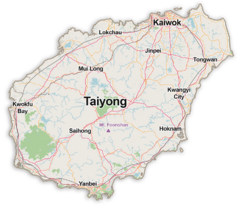Taiyong
Taiyong | |
|---|---|
|
Flag | |
| Anthem: "National Anthem of the Republic of Taiyong" 太勇共和國國歌 Taii Yung Gung Woh Gwok Gwok Goh | |
 Map of Taiyong | |
| Capital and largest city | Kaiwok 22°10′N 108°18′W |
| Official languages | Taiyongese |
| Recognised national languages | Hakka English |
| Ethnic groups | 92% Heng 6% Chaoshanese 2% Others |
| Demonym(s) | Taiyongese |
| Government | Unitary Presidential Representative Democratic Republic |
• President | Wei Cheng |
• Vice President | Huang Lee |
| Legislature | Parliament |
| Senate | |
| State Commission | |
| Establishment History | |
• Heng Dynasty Arrives | c. 150 |
• Kingdom of Taiyong | 1697 |
• Shouese Annexation | July 25, 1907 |
• Proclamation of the First Republic | August 13, 1917 |
• Second Republic | October 12, 1956 |
• Third Republic | April 22, 1985 |
• Current Constitution | May 1, 1986 |
| Area | |
• Total | 33,210 km2 (12,820 sq mi) |
• Water (%) | 3.39 |
| Population | |
• 2022 estimate | 21,586,500 |
• Density | 650/km2 (1,683.5/sq mi) |
| GDP (PPP) | 2022 estimate |
• Total | $1.675 trillion |
• Per capita | $72,480 |
| GDP (nominal) | 2022 estimate |
• Total | $751.930 billion |
• Per capita | $32,339 |
| Gini (2022) | medium |
| HDI (2022) | 0.920 very high |
| Currency | New Taiyong Dollar ($) (NTD) |
| Time zone | UTC-8 |
| Date format | yyyy-mm-dd (CE−2022) |
| Driving side | right |
| Calling code | +909 |
| ISO 3166 code | TYG |
| Internet TLD | .ty |
Taiyong (Taiyongese: 太勇) is an island country in far eastern Markion. It is situated at the junction of the Orange Sea and the Fuyan Gulf in the eastern Haolong Strait, neighboring the Republic of Ling Shou to the Northwest. The area controlled by Taiyong consists of 9 islands with a combined area of 33,210 square kilometers. The main island of Taiyong, has an area of 33,200 square kilometers, with semi-forested mountain ranges dominating the southern two-thirds and gently rolling plains in the northern third and coasts, where its highly urbanized population is concentrated. The capital is Kaiwok, which forms the largest metropolitan area of the country. Other major cities include Yanbei, Lokchau, Tongwan, Kwangyi, Jingpei, and Mui Long. With 21.5 million inhabitants, Taiyong is among the most densely populated countries in the region.
The Taiyong islands were originally inhabited by Austronesian people as early as 30,000 years ago. By the second century CE, the Western Heng dynasty established a military garrison there following the arrival of General Lei Fong. The process of sinicization in Taiyong was driven by the conjunction of Heng territorial expansion and the arrival of Heng Chinese military and administrative personnel who settled on the island. Over the course of many centuries, dynastic Heng ruling authorities exiled individuals condemned by the imperial courts as criminals or political dissidents to the Taiyong Islands, where they were subjected to harsh labor in the tropical climate as a form of punishment. In 1697, the Changyuan Dynasty fled to the island, establishing the Kingdom of Taiyong until 1907 when it was annexed by Ling Shou during the The Fuyan Gulf War. Shouese rule ended following the Treaty of Impersol in 1917, after which the First Republic of Taiyong was established.
Despite limited natural resources, and early hardships, Taiyong rapidly industrialized, integrating itself within the world economy with an export-oriented market. The Second Republic was established after the January Uprising in 1956, in which Zhu Guoying consolidated power to establish absolute rule. Zhu Guoying immediately suspended regular elections and appointed more than half of the State Commission. Suppression of human rights, imprisonment of journalists, and repression of political freedoms continued until the Kaiwok Student Revolution in 1985, when authoritarian rule officially ended, and the democratic Third Republic was established.
Taiyong is an advanced, liberal democracy with a semi-parliamentary system, proportional representation, and universal suffrage. The president serves as head of government while the State Commission serves as the confidence chamber of the bicameral legislature. Since the early 1980s, the country has has achieved rapid economic growth, and leads the world in literacy rates and education, but struggles with high suicide rates, long working hours, and high rates of industrial accidents. Taiyong is also the headquarters of Markion Energy Protocol (MEP) and a named member of the Iron Alliance, as well as a frequent participant at many international conferences and events. The country is a regional power, and although it has traditionally maintained a non-aggressive method of foreign affairs, Taiyong consistently maintains a well-trained, rapidly mobilized active-duty military that encompasses sea, air, and land forces.
